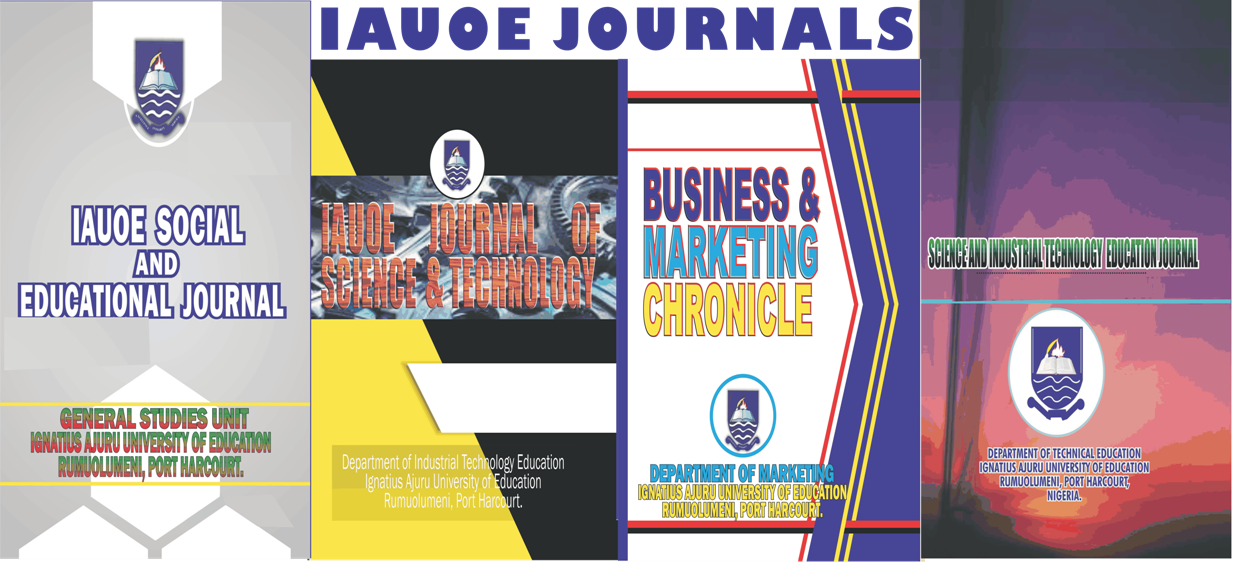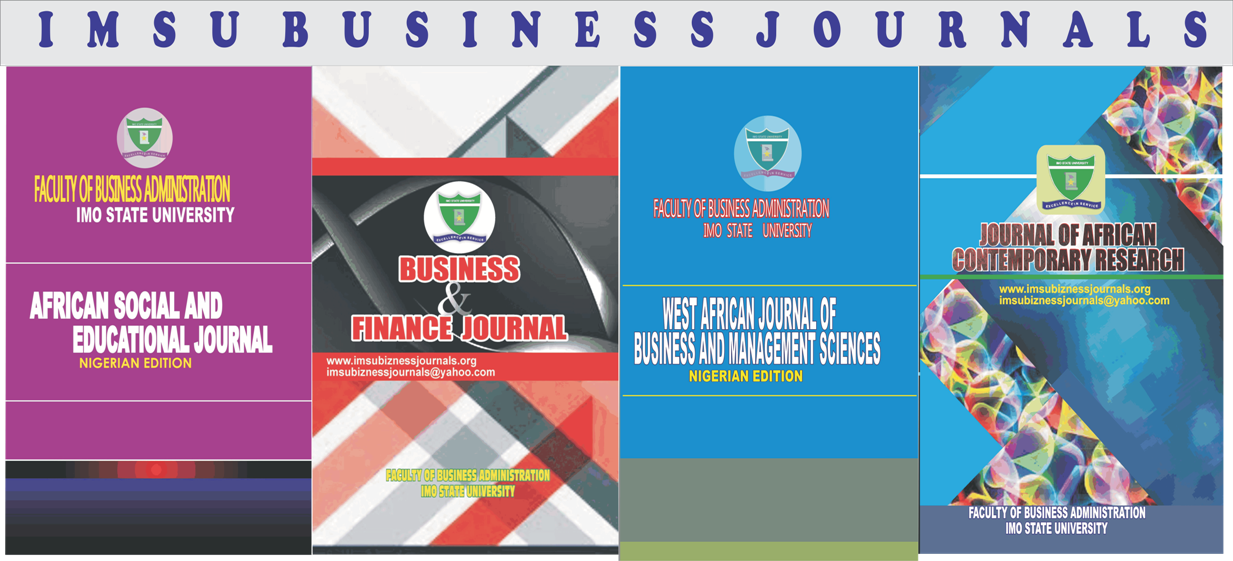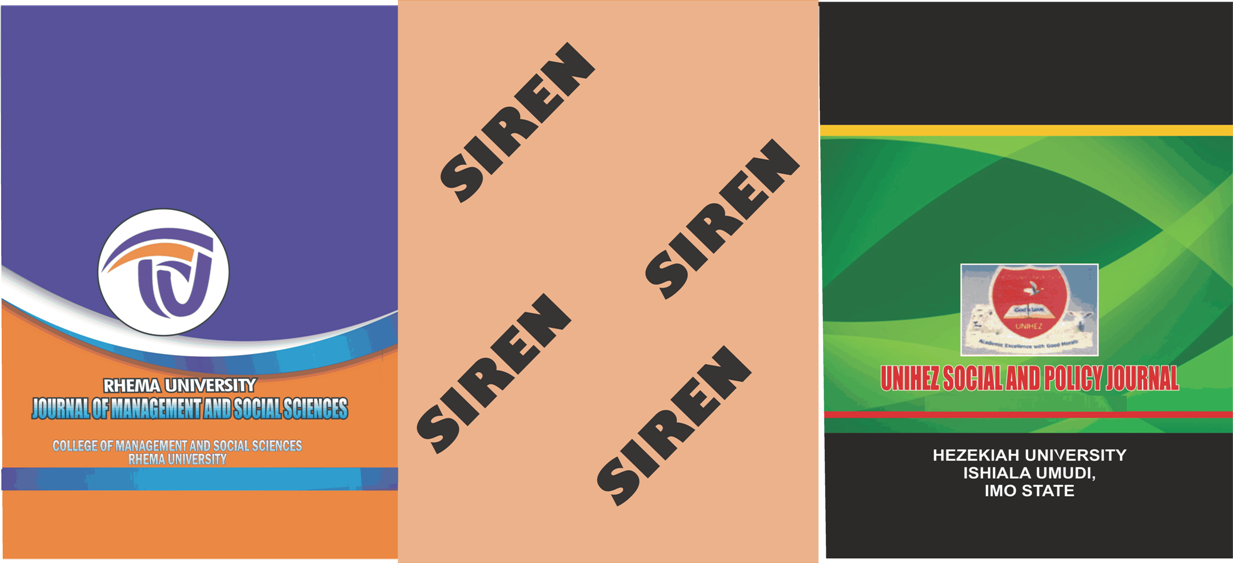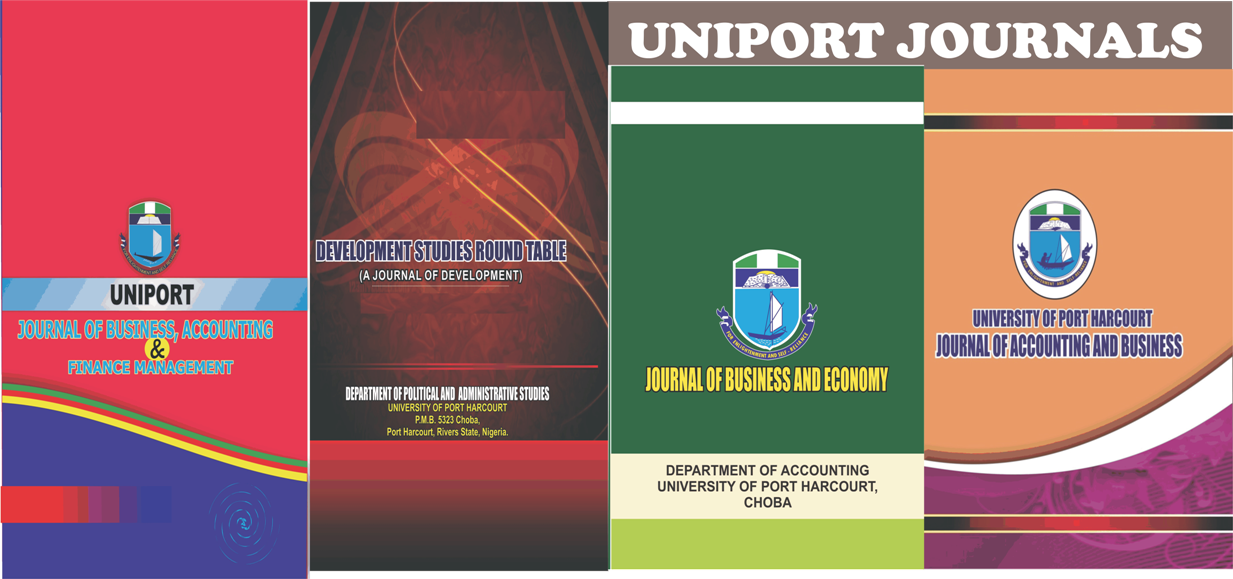UNIVERSITY OF PORT HARCOURT JOURNAL OF ACCOUNTING & BUSINESS
ISSN NUMBER: 979-52334| 1 | Title: THE CAUSAL RELATIONSHIP BETWEEN PUBLIC DEBT AND ECONOMIC GROWTH IN NIGERIA Author: AKANDE, OMOWUNMI COMFORT., TELLA, SHERIFFDEEN A. AND OGBEBOR, PETER I. Abstract: The role of institutions as a precursor to the success or otherwise in public debt management in Nigeria has received less attention. Considering regulations can help to ensure that public debt is managed in a way that does not lead to unsustainable levels of borrowing, it is essential to examine the growth-inducing capacities of public debt when institutional quality interacts with public debt. Therefore, this study examined The Causal Relationship between Public Debt and Economic Growth in Nigeria from 1996 to 2021. This study employed an ex-post-facto research design. Secondary annual time series data were used for this study and sourced from various publications of the World Bank (World Development Indicators) (WDI), Central Bank of Nigeria (CBN) Statistical Bulletin, Debt Management Office (DMO) statistical reports and the World Governance Indicator (WGI) database. The data collected were analysed using the Non-Linear Autoregressive Distributed Lag (NARDL) procedure and the Granger causality test using the frequency domain approach to explain the models structural dynamics and reach meaningful conclusions on the subject. The inferences were drawn at a 1% and 5% significant level. The causality analysis, this study found that the debt to GDP ratio returns short-run uni-directional causality to economic growth in Nigeria. External debt has both short-run and long-run uni-directional causality to economic growth in Nigeria. Domestic debt has only short-run unidirectional causality to economic growth. Debt servicing return only long-run uni-directional causality to economic growth. Real GDP has both short-run and long-run unidirectional causality to debt servicing. Tax revenue has both short-run and long-run uni-directional causality to GDP. The study concluded public debt has a positive relationship with economic growth in Nigeria both in the short run and the long run. Therefore, the study recommended that the Nigerian government should use expansionary fiscal policies to stimulate economic growth in the short run and long run. This can involve increasing government spending on infrastructure, education, and health, which can create jobs and boost economic activity while prioritising debt-financed investments in critical sectors to improve productivity and competitiveness. Keywords: Public Debt, Debt Servicing, ARDL, Institutions, Real GDP, Causality. ... more |
|
| 2 | Title: IMPACT OF SUSTAINABILITY PRACTICES DIMENSIONS ON TOTAL ASSETS OF LISTED FIRMS ON NIGERIAN EXCHANGE GROUP Author: ADEGBIE FOLAJIMI FESTUS, AJIBADE AYODEJI & EKPENI KEVIN CHINWE Abstract: This study investigated the Impact of Sustainability Practices dimensions on total assets of listed Firms on Nigerian Exchange Group. Specifically the study focused on book value of current and non-current asset in the statement of financial position at year end for the selected firms and period. This study used a static panel data, multistage sampling technique was adopted to pick samples of 26 firms from the population of 168 firms listed on the Nigeria exchange as at December 31,2020. Findings revealed that proxies of sustainability practices dimensions reacted differently to total asset of sampled firms. ECSP (P=0.015) and EVSP (P=0.022) have a significant effect on total asset (TA), while SOSP and GOSP insignificantly affect TA (SOSP: p=0.426; GOSP: P=0.684). Considering the coefficients of the explanatory variables; ECSP (α = 2.199); SOSP (α = 0.193); and EVSP (α = 0.551); GOSP (α = - 0.141) The study concluded that that ECSP, SOSP, and EVSP positively affect TA while GOSP has a negative effect on TA. Also, firm size provides significant controlling effect on the interactions. Overall sustainability practices have a significant impact on total asset values of listed firms on the Nigeria Exchange with and without the control of firm size. The study recommended that the management of firm listed on the Nigeria Exchange should fully engage in sustainability practice to enjoy appreciation in total asset. Keywords: Total Assets; Sustainability; Nigeria Exchange Group; Sustainability Practices ... more |
|
| 3 | Title: DO TAX INCENTIVES AFFECT REINVESTMENT OF EARNINGS? EVIDENCE FROM MANUFACTURING COMPANIES LISTED IN NIGERIA Author: AJAYI FEDELIX ADEPOJU, FOLAJINMI FESTUS ADEGBEIE & SAMUEL OLAJIDE DADA Abstract: Purpose – The study investigated the nexus between tax incentives and reinvestment of earnings of manufacturing companies listed in Nigeria. Specifically, the study investigated the effect of export Incentive (EI), Capital Allowance Incentives (CAI), Tax Holiday Incentives (THI), Investment Allowance Incentives (IAI) on reinvestment of firms listed on Nigeria exchange. Design/methodology/approach – The study adopted ex post facto research design, the population comprises 76 firms of consumer and industrial sector of NGX as at 2022. However, our analysis was restricted to 25 multinational manufacturing companies on the NGX based on availability of data Findings –. The findings from the study reveals that tax incentives (export Incentive (EI), Capital Allowance Incentives (CAI), Tax Holiday Incentives (THI), Investment Allowance Incentives (IAI)) has a significant effect on reinvestment of earnings of manufacturing firms listed on the Nigeria exchange although in different patterns. Practical implications – The implication of our findings is that tax incentive should be considered as one of the key drivers to improve retained earnings of manufacturing sectors and should focus on specific tax incentives that drives expansion Recommendations- The study recommend that tax authorities should focus on specific tax incentives that drives expansion. Tax incentive policies should be industry specific and continuous interrogation of tax incentives policy is needed time to time to be able to carry out proper evaluations, action plan and adjustments. Key Words: Foreign direct investment FDI; export Incentive (EI); Capital Allowance Incentives (CAI); Tax Holiday Incentives (THI); Investment Allowance Incentives (IAI). ... more |
|
| 4 | Title: ECONOMIC GROWTH AND STOCK MARKET RETURNS IN NIGERIA: AN EMPIRICAL EVIDENCE Author: PROF. OWUALAH S. I., DR.AKINTOLA F. A. & ADESANYA A. O Abstract: This study investigated how economic growth drives stock market returns in the Nigeria. Secondary time series datasets from the first quarter of 2010 to the last quarter of 2022, a period of 13 years was used for the study. The study applied the Autoregressive Distributed Lag (ARDL) to examine the short run and long run impact of economic growth on stock market returns in Nigeria. The empirical estimation showed evidence of long-run relationship between the gross domestic product and stock returns in Nigeria. In the long run there is evidence that gross domestic product and stock market capitalization and stock turnover ratio have positive and significant relationship with stock returns, implying that increases in gross domestic product, stock market capitalization, and stock turnover ratio lead to significant increase in stock returns in Nigeria. From the result, in the short-run, gross domestic product and stock turnover ratio have positive and significant relationship with stock returns in conformity with the results obtained in the long run where gross domestic product and stock turnover ratio were significant factors influencing changes in stock market returns. However, for the stock market capitalization there is evidence of a negative and significant relationship with the stock returns. The study concluded that economic growth positively and significantly drive stock market returns in Nigeria and recommended that the Securities and Exchange Commission should improve governance, transparency, and accountability on the market to increase investor confidence. Keywords: Stock returns; Economic growth; Gross domestic product (GDP); Nigerian Stock Market ... more |
|
| 5 | Title: ACCESSIBILITY OF INTERVENTION FUNDS TO MICRO, SMALL AND MEDIUM ENTERPRISES (MSMES) IN SOUTH-WEST, NIGERIA Author: OMOSEBI TOLULOPE R., TELLA SHERIFFDEEN A. (PhD). & ANDY OKWU T. (PhD). Abstract: The impact financing has on the business performance and capacity development of Micro, Small and Medium Enterprises (MSMEs) in developing the Nigerian economy cannot be over emphasised. This industry is saddled with the potential to reach out to relatively low scale investors, hence developing the home industries. However, in spite of vast interventions from government, MSMEs have long-suffered from never-ending challenges of competitive disadvantage, lack of awareness, declining sales growth, poor financing and declining in profitability. With the use of cross-sectional survey design, data was collected from a sample size of 1,560 out of a population of 6,445,452 MSMEs in South-West, Nigeria. The multiple regression results showed that MSMEs in this region had a low access to intervention funds (Anchor borrowers (ANCR), Micro, Small and Medium Enterprises Development Fund (MSMF), BOI/YES Funding, Agricultural credit Guarantee scheme Fund (ACSF), Agri-Business/Small and Medium Enterprise Investment Scheme (AGSMEIS) and Targeted Credit Facility (TCF), as indicated by the mean score of 1.77 on the scale of 5. This was due to the lack of awareness of these intervention fund schemes. The research suggests that the Central Bank of Nigeria should guarantee an enhanced accessibility of funding to MSMEs at a reduced cost, in order to foster their expansion. Emphasis should also be placed on revitalising most of the dying intervention fund schemes as the study has shown that although they are integral in the revitalisation of the MSMEs, these intervention funds are largely unknown and not useful. Keywords: Business finance, Profitability, Intervention funds, MSMEs, South-West, Nigeria ... more |
|
| 6 | Title: LEADERSHIP DYNAMICS AND EMPLOYMENT GROWTH Author: DR. EMMANUEL ETHEL IFEYINWA Abstract: This study is aimed at examining the impact of leadership dynamics on employee growth. Some organizations are out of business as a result of poor leadership approach. In order to carry out proper investigation into the study, a conceptual framework was formulated showing leadership dynamics as the independent variable, employee growth as the dependent variable and organizational climate on the moderating variable. These also have dimensions and measures. The study is anchored on some theoretical foundations such as transformational leadership, transactional leadership, Trait and Behavioural leadership. The conceptual review gives detailed explanations of the dimensions and measures. Base on the outcome of the study, it was found out that leadership dynamic is a strong factor in the organization which can determine to a great extent the performance of the organization in terms of productivity, market share and the employee growth. Hence, it was recommended that organizations seeking for success should adopt an effective leadership style like the transformational model in order to achieve employee growth and organizational success and productivity. Keywords: Performance, Leadership, Growth, Employee, Dynamics, Transformational. ... more |
|
| 7 | Title: CORPORATE GOVERNANCE AND AUDIT REPORT LAG IN FOOD AND BEVERAGE COMPANIES IN NIGERIA Author: EGUASA, REUBEN EGBERANMWEN (PhD. STUDENT) & OHIOKHA, GODWIN PhD Abstract: This study aimed to improve the timeliness with which financial statements are generated, given to the auditor, and signed by the auditor by conducting an experimental investigation of the link between corporate governance and audit report lag. The research population consists of 34 companies manufacturing food and beverages quoted on the Nigerian stock exchange between 2016 and 2021. Randomly selected samples of 24 companies were taken from the whole population being studied. The publicly accessible annual reports of the firms under consideration were the source of the data used in the study. The approach of multiple regression was used to analyze the data. The findings show that managerial ownership and board size have a detrimental but little impact on audit report lag. The financial expertise of the audit committee and the board’s independence has a detrimental and significant impact on the audit report lag. According to the research, businesses should support managerial Ownership to avoid delays, ensure that financial statements are prepared and presented to auditors on time for audit purposes, and the auditor to sign the report within the audit report lag. A certain number of shares should be available to managers at a discount. An audit committees member should be reasonably financially literate. These days, boards should keep as far away from the actual handling of money as possible. For everyone to participate in problem-solving and decision-making, boards should comprise diverse individuals with various backgrounds and areas of expertise. Keywords: Corporate Governance, Audit Report Lag, Managerial Ownership, Audit Committee financial expertise, Board Independence, Board Size ... more |
|
| 8 | Title: BOARD GENDER DIVERSITY AND MARKET VALUE OF LISTED MANUFACTURING FIRMS IN NIGERIA Author: JOY O. OSEMWEGIE-ERO (Ph.D), BEAUTY E. JACKSON-AKHIGBE (Ph.D) & TITUS C. UMANAH Abstract: The study explores the relationship between board gender diversity and the market value of listed manufacturing firms in Nigeria. An ex-post-facto research design was used. The population of the study was 25 listed manufacturing firms in Nigeria, as documented by Nigeria Exchange Group. The Purposive sampling technique was used to select the sampling size of the big five (5) manufacturing firms in Nigeria. Data were obtained from the audited annual financial statements of the selected manufacturing firms in Nigeria between 2013 – 2022. This was analysed using descriptive and categorical regression analysis to test the research hypotheses. The findings of this study revealed that there is significant relationship between board gender diversity and the market value of listed manufacturing firms in Nigeria. Based on these findings, the study recommends that female managers and other key stakeholders incorporate board gender policies and regulations to improve the market value of listed manufacturing firms in Nigeria. Also, manufacturing firms should prioritize the appointment of board members based on their skills, competencies, experience, and level of education. The policy implication for this study will guide stakeholders in formulating strategies and policies to enhance board gender diversity and improve the market value of listed manufacturing firms in Nigeria. Keywords: Board, Gender Diversity, Market Value and manufacturing firms. ... more |
|
| 9 | Title: SUBSIDY REMOVAL AND IMPLICATIONS FOR ECONOMIC DEVELOPMENT IN NIGERIA Author: GODFREY O. OMOJEFE, OLOLADE SIKIRU ONIYIDE AND EBERE P. IFIONU Abstract: Fuel subsidy and its implications on various sectors have been a contentious subject in Nigeria, reflecting a complex interplay of economic, social, and political factors. This study aims to analyze the effects of fuel subsidy removal in Nigeria, particularly focusing on the domain of economic development. Through a systematic methodology, the research draws on empirical findings and fictitious literature to explore the implications. Economically, the study confirms that removing fuel subsidies can improve fiscal sustainability, encourage market efficiency, and potentially increase investment and growth, with certain caveats (Jones et al., 2023; Smith & Clark, 2018; Williams, 2016). Socially, the findings reveal a significant impact on lower-income households, emphasizing the need for appropriate social safety nets (Taylor, 2012; Brown & Thompson, 2014). Politically, the research supports the possibility of improved governance and transparency with subsidy removal and introduces a novel finding concerning political stability (Davis & Lee, 2017; King, 2019). The conclusions drawn are vital for policymakers, offering guidance on implementing subsidy removal while balancing economic efficiency with social equity and political stability. The recommendations provided in this study highlight the importance of a strategic, transparent, and balanced approach to subsidy policy in Nigeria. Keywords: Fuel subsidy, Nigeria, economic growth, social welfare, Governance ... more |





